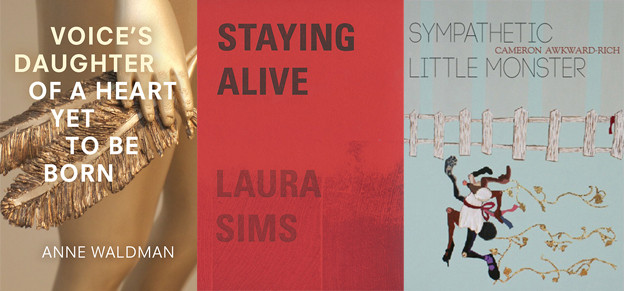
Voices, lives, and monsters
Kenna O'Rourke

Our first capsule reviews of 2017 feature three recent poetry titles.
Voice’s Daughter of a Heart Yet to Be Born, Anne Waldman (Coffee House Press, 2016)
William Blake’s Thel is dubbed the “principle mover” [sic] in this collection, though it would perhaps be mistaken to consider the Thel of Waldman’s imagination strictly Blake’s. The Thel that guides this largely prose-shaped text is framed by Artaud, Beckett, the occult, deranged letters addressed to Waldman, and visions of the end time; in other words, she is a Thel distinctly Waldman’s, mystical and dark. The book is a witchy handbook, a mystery: “When the lights roll Thel will be gone. She will find the semantics to disappear. But first she will manifest her conceptual power. Her androgyny.”
Staying Alive, Laura Sims (Ugly Duckling Presse, 2016)
Laura Sims walks us through the ruins of a post-apocalyptic city in this collection inspired by The Road and other mass-disaster texts. Sims notes in her afterword that she is drawn to Chernobyl’s remnant structures as proof that humans will be missed in the wake of desolation; in many ways this twisted optimism is the sentiment that pervades this text. These lines are less about lessons in the tenacity of the human spirit (“And no one would help / The humans left // Not even the humans”) or the false hope of regeneration as they are about what can persist, what we leave behind. Sims dangles open parentheses and quotation marks, the infrastructure of the lines breaking down as the last of humanity leaves its desperate mark. She splices her verse into bits of shrapnel, and “The city teems. Above / It isn’t heaven: it’s / The ruin // Where / You shine.”
Sympathetic Little Monster, Cameron Awkward-Rich (Ricochet Editions, 2016)
“You are vast. You contain // a barren sidewalk,” writes Cameron Awkward-Rich in this book of ghosts and shed identities. Awkward-Rich traverses the memory of girlhood, his childhood attaining a darkly mythic hue as he navigates the evolution of his queer black identity. The speaker’s haunted body persists; becomes complicated and powerful in the face of societal condemnation; rules as “an emperor of trash.” Awkward-Rich articulates familial history and the personal nature of queer theory in beautiful, urgent verse: “What queer kid doesn’t know that she is the / monster in the movie? The one who delights in / the death of the golden boy.”